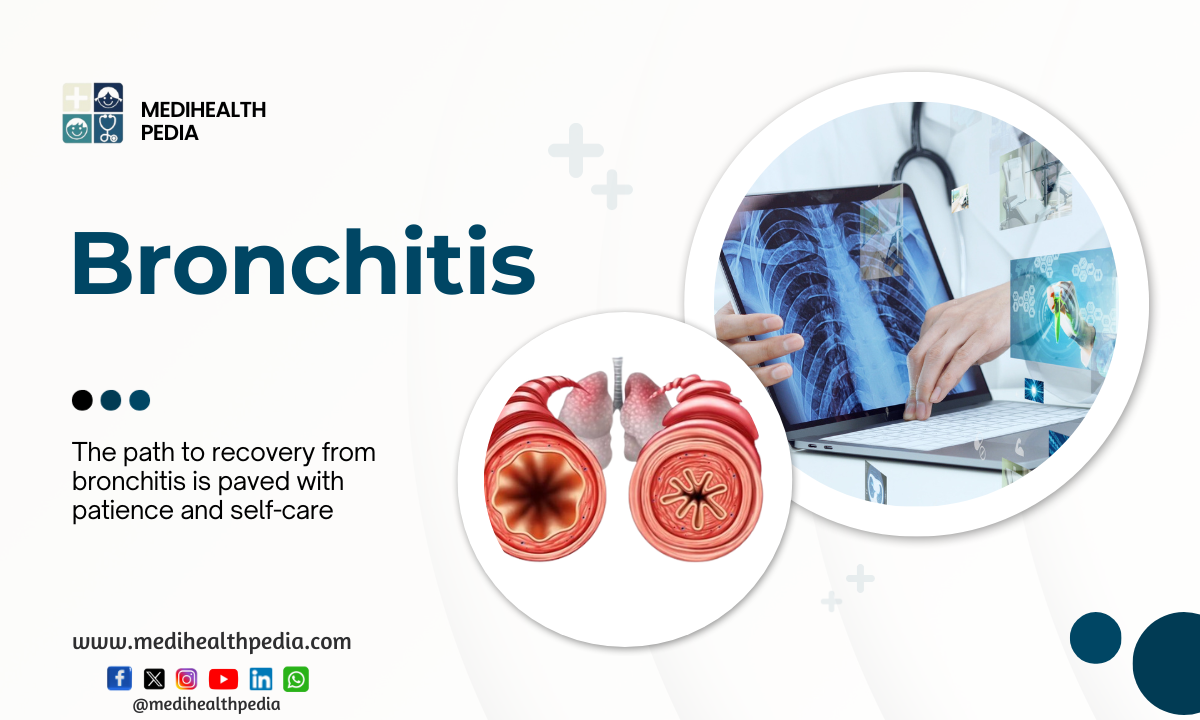Managing Chronic Bronchitis: A survival Guide with Natural Strategies for Better Bronchitis Management
Table of Contents
ToggleIntroduction
Bronchitis, a prevalent respiratory affliction, touches the lives of millions across the globe, casting a shadow of discomfort, persistent coughing, and, in some cases, grave complications. In this exhaustive guide, we embark on an extensive journey through the realms of bronchitis, shedding light on its myriad aspects. We provide a detailed and comprehensive overview of the condition, meticulously dissect its clinical presentation, delve into the intricate world of differential diagnosis, scrutinize the exhaustive workup required for diagnosis, and underscore the imperative need for public awareness about bronchitis. Furthermore, we explore an array of preventive strategies, traverse the treatment and management landscape, investigate the potential role of herbal drug therapies, propose crucial lifestyle modifications, and ultimately conclude with a holistic perspective on living harmoniously with bronchitis.

Bronchitis Overview
Bronchitis, the inflammation of the bronchial tubes responsible for transmitting air to and from the lungs, manifests in two primary forms:
- Acute Bronchitis: Typically ignited by viral infections, acute bronchitis strikes suddenly, marked by the abrupt onset of symptoms. These include a persistent cough, chest discomfort, and heightened mucus production. Acute bronchitis often self-resolves within a few weeks.
- Chronic Bronchitis: Nestled within the spectrum of chronic obstructive pulmonary disease (COPD), chronic bronchitis is a protracted ailment characterized by a ceaseless cough and escalated mucus production. Often intertwined with smoking, it can culminate in serious respiratory complications.
Clinical Presentation
The clinical presentation of bronchitis is intricate and multifaceted, contingent on the type and the underlying causes of the condition:
- Acute Bronchitis Symptoms: Those grappling with acute bronchitis commonly endure a persistent cough, chest discomfort, fatigue, and, occasionally, a low-grade fever. The cough initially produces clear or white mucus, which may thicken and change color over time.
- Chronic Bronchitis Symptoms: Chronic bronchitis is characterized by an unremitting cough and heightened mucus production. Patients may also grapple with shortness of breath, wheezing, and chest tightness. These symptoms persist for at least three months per year for two consecutive years.
Differential Diagnosis
Numerous conditions share symptoms with bronchitis, making a comprehensive consideration of differential diagnoses crucial:
- Asthma: Wheezing and shortness of breath, common to both asthma and chronic bronchitis, can be confounding. Nevertheless, asthma symptoms often exhibit variability and may be provoked by allergies or physical exertion.
- Pneumonia: Pneumonia overlaps with acute bronchitis in several symptoms, including cough, fever, and chest pain. Distinguishing pneumonia involves assessing the severity of symptoms and necessitates specific antibiotics for treatment.
- COPD: Chronic obstructive pulmonary disease encompasses a spectrum of conditions, including chronic bronchitis and emphysema. Discriminating between these conditions frequently demands specialized testing like spirometry.
Workup for Diagnosis
Bronchitis diagnosis entails a meticulous fusion of medical history, physical examination, and, in certain cases, diagnostic tests:
- Medical History: Healthcare providers meticulously extract information about symptoms, seeking to elucidate their nature, duration, and any relevant particulars.
- Physical Examination: A physical examination serves to assess lung function, rule out alternative causes of symptoms, and screen for other potential health concerns.
- Diagnostic Tests: When necessitated, diagnostic tests, such as chest X-rays, may be administered to exclude alternative conditions. Pulmonary function tests gauge lung capacity and the extent of airway obstruction.
Public Awareness about Bronchitis
Public awareness about bronchitis assumes paramount importance for several compelling reasons:
- Early Detection: Heightened recognition of bronchitis symptoms and the prompt pursuit of medical intervention can lead to early detection and treatment.
- Preventive Measures: Public education serves to nurture a comprehension of the risk factors for bronchitis, such as smoking, thereby empowering individuals to mitigate these risks effectively.
- Reducing Transmission: An understanding of the contagious nature of acute bronchitis encourages people to undertake precautions that hinder its spread, thereby curbing its prevalence.
Prevention of Bronchitis
An arsenal of strategic measures is pivotal for preventing bronchitis:
- Smoking Cessation: The cessation of smoking takes precedence, as it stands as the principal cause of chronic bronchitis.
- Hand Hygiene: Vigilant hand hygiene curtails the risk of viral infections that can trigger acute bronchitis.
- Avoiding Irritants: Minimizing exposure to environmental irritants, such as dust and fumes, plays a crucial role in preventing bronchial inflammation.
- Vaccination: The consistent receipt of the influenza vaccine, in conjunction with the pneumonia vaccine as recommended, substantially diminishes the risk of bronchitis-related complications.
Treatment and Management
The treatment and management of bronchitis are dynamic and predicated on the type and the underlying causes of the condition:
- Acute Bronchitis: Acute bronchitis, often kindled by viral infections, is frequently managed through rest, adequate hydration, and over-the-counter cough and cold medications. It’s pivotal to comprehend that antibiotics hold no sway over viral infections.
- Chronic Bronchitis: Chronic bronchitis, predominantly linked with smoking, mandates a multifaceted approach. Smoking cessation takes precedence. Medications, including bronchodilators and corticosteroids, can aid in symptom management and inflammation mitigation. Participation in pulmonary rehabilitation programs can enhance lung function. In severe instances, oxygen therapy may be a necessity.
Herbal Drug Therapies
Certain herbal remedies may extend supplementary support for bronchitis. It is crucial to note that they should never replace standard medical treatment:
- Echinacea: Echinacea, lauded for its immune-boosting properties, may assist in alleviating bronchitis symptoms and potentially shortening their duration.
- Thyme: Thyme boasts natural antitussive properties, often employed to soothe bronchitis-related coughs.
- Eucalyptus: Eucalyptus oil features in steam inhalation, offering relief from congestion and facilitating easier breathing.
- Ginger: Ginger, with its anti-inflammatory attributes, serves as a cornerstone for a soothing tea that can alleviate bronchitis symptoms.
Lifestyle Modification
Lifestyle modifications are integral to bronchitis management and prevention:
- Quit Smoking: For individuals who smoke, quitting stands as the single most efficacious measure to prevent or manage bronchitis.
- Stay Hydrated: Maintaining adequate hydration ensures that mucus remains thin and more easily expelled from the airways.
- Humidifiers: Employing humidifiers in the home helps maintain optimal indoor humidity levels, significantly easing bronchitis symptoms.
- Avoid Irritants: Minimizing exposure to airborne irritants, such as dust, allergens, and air pollution, plays a pivotal role in bronchitis management and prevention.
- Regular Exercise: Engaging in regular, moderate exercise is not only beneficial for overall health but also significantly contributes to improved lung function.
Conclusion
Bronchitis, whether acute or chronic, has the potential to significantly impact an individual’s respiratory health and overall quality of life. Public awareness, early detection, preventive measures, and appropriate medical treatment are pivotal for effective bronchitis management. While herbal remedies and lifestyle modifications can offer invaluable support, they should never replace standard medical treatment. This comprehensive guide illuminates the intricate landscape of bronchitis, from its clinical presentation to prevention and management, empowering individuals to navigate this respiratory condition and enhance their respiratory well-being comprehensively.

